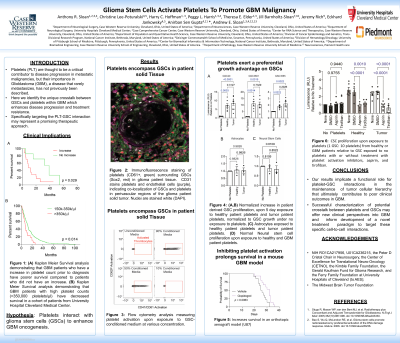Glioma Stem Cells Activate Platelets To Promote GBM Malignancy
Glioma Stem Cells Activate Platelets to Promote GBM Malignancy
Friday, April 21, 2023


Andrew E. Sloan, MD, FAACS, FACS (he/him/his)
Chief of Neuroscience
Piedmont Health
Atlanta, Georgia, United States
ePoster Presenter(s)
Introduction: The tumor microenvironment (TME) in glioblastoma (GBM) is characterized by regions of necrosis, neoangiogenesis, and invasion. Glioma stem cells (GSCs) comprise a small subpopulation of the GBM TME, and are characterized as self-renewing, multipotent, and potentially responsible for treatment resistance and progression. Platelets (PLT) are thought to be a critical contributor to disease progression in metastatic malignancies, but their importance in GBM, a disease that rarely metastasizes, has not previously been described. Here we identify the unique crosstalk between GSCs and platelets within GBM which enhances disease progression and treatment resistance. Specifically targeting the PLT-GSC interaction may represent a promising therapeutic approach.
Methods: Clinical analysis was completed using cohorts of GBM patients at University Hospital Seidman Cancer Center. Immunofluorescence, qPCR, and western blot were used to evaluate the presence of GSCs and platelets and their localization in GBM patient tissue. Cell titer glo, sphere formation assays, and RNA sequencing were conducted to determine the functional effect of healthy and GBM patient platelets on GSC growth.
Results: Our clinical studies suggest elevated platelet counts positively correlate with tumor growth and negatively correlate to overall patient survival (p < 0.02). Platelets and Sox 2+, CD-133+ GSC specifically co-localize in the hypoxic niche of the GBM TME. Furthermore, platelet exposure to GSCs results in increased proliferation of GSCs specifically by increasing the self-renewing capacity of GSCs (p < 0.001), and an increased “Stem-like” transcriptional pattern with expression of OCT4 and NANOG (p < 0.002). Conversely, inhibition of platelet activation by GSCs abrogates platelet-mediated GSC self-renewal and growth (p < 0.0005). Similarly, inhibiting platelet activation decreases tumor formation in vivo (p < 0.005).
Conclusion : Our findings uncover the interdependent relationship between platelets and GSCs that drive GBM malignancies and identify therapeutically targets for the treatment of GBM.
Methods: Clinical analysis was completed using cohorts of GBM patients at University Hospital Seidman Cancer Center. Immunofluorescence, qPCR, and western blot were used to evaluate the presence of GSCs and platelets and their localization in GBM patient tissue. Cell titer glo, sphere formation assays, and RNA sequencing were conducted to determine the functional effect of healthy and GBM patient platelets on GSC growth.
Results: Our clinical studies suggest elevated platelet counts positively correlate with tumor growth and negatively correlate to overall patient survival (p < 0.02). Platelets and Sox 2+, CD-133+ GSC specifically co-localize in the hypoxic niche of the GBM TME. Furthermore, platelet exposure to GSCs results in increased proliferation of GSCs specifically by increasing the self-renewing capacity of GSCs (p < 0.001), and an increased “Stem-like” transcriptional pattern with expression of OCT4 and NANOG (p < 0.002). Conversely, inhibition of platelet activation by GSCs abrogates platelet-mediated GSC self-renewal and growth (p < 0.0005). Similarly, inhibiting platelet activation decreases tumor formation in vivo (p < 0.005).
Conclusion : Our findings uncover the interdependent relationship between platelets and GSCs that drive GBM malignancies and identify therapeutically targets for the treatment of GBM.
